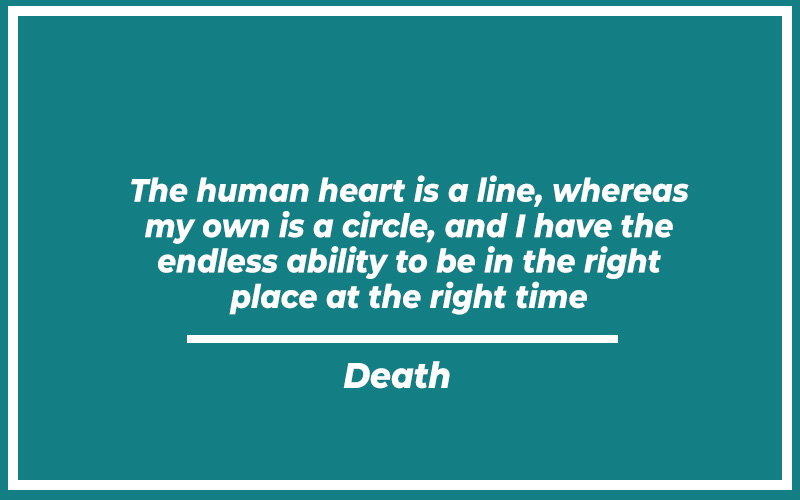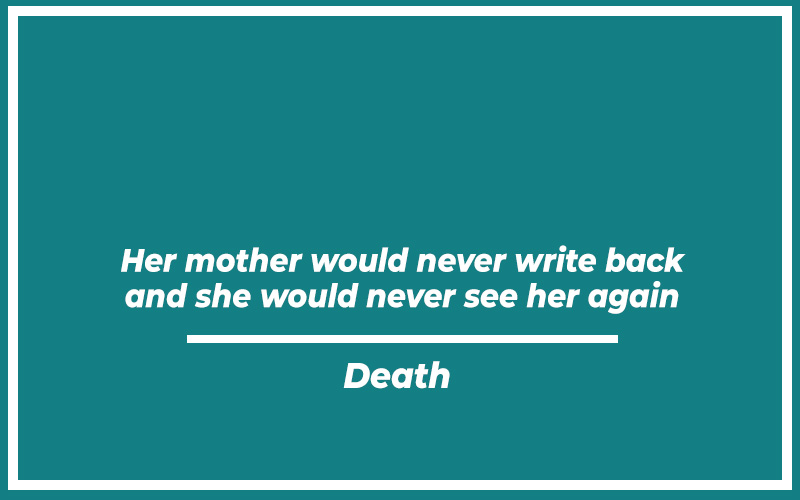The Book Thief, by Markus Zusak, is a powerful story narrated by Death itself. Set in war-torn Germany, the novel follows Liesel Meminger, a young girl who finds solace in stealing books.
The quotes from this book explore themes of resilience, the power of words, and the complexities of human nature during a dark time in history.
The Book Thief Quotes

“To most people, Hans Hubermann was barely visible. An un-special person.” – Death
This quote highlights Hans Hubermann’s humility and the quiet impact he has on those around him. Despite being seen as ordinary, Hans’ actions reveal his deep compassion and strength. He represents the unsung heroes who perform acts of kindness without seeking recognition.
This portrayal challenges the notion of what it means to be significant, emphasizing that true heroism often lies in unnoticed, everyday acts of goodness. Hans’ character serves as a reminder of the profound influence of quiet, steadfast decency.
Also Read: Blessed Good Morning Quotes (with Explanation)
“The words. Why did they have to exist? Without them, there wouldn’t be any of this.” – Death
This quote reflects the dual-edged nature of words in The Book Thief. While words are powerful tools for expression and resistance, they can also propagate hatred and violence, as seen with Nazi propaganda. Liesel grapples with this complexity, recognizing that the very medium she loves can also cause great harm.
This paradox underscores the central theme of the novel—the potent, ambivalent power of language. It calls readers to consider the responsibility that comes with wielding words and the impact they can have.
“His soul sat up. It met me. Those kinds of souls always do—the best ones. The ones who rise up and say, ‘I know who you are and I am ready. Not that I want to go, of course, but I will come.'” – Death
This quote portrays the dignity and acceptance of those who face death with courage. It highlights Death’s respect for brave souls who confront their end with understanding and grace. This moment emphasizes the nobility found in acceptance and the strength of character it takes to meet death head-on.
It also provides a glimpse into Death’s perspective, showing an appreciation for the resilience and fortitude of humans, even in their final moments. This adds depth to Death’s role, making it a compassionate observer of human bravery.
“It was a Monday and they walked on a tightrope to the sun.” – Death
This metaphorical quote captures a moment of fragile hope and precarious balance in the characters’ lives. The “tightrope” suggests the thin line they walk between survival and disaster, while the “sun” represents their aspirations and dreams.
This imagery conveys the constant tension and uncertainty faced by Liesel and her companions during the war. It also highlights their determination to move forward despite the dangers, underscoring the novel’s themes of resilience and the pursuit of light in dark times.
“The only thing worse than a boy who hates you: a boy that loves you.” – Death
This quote encapsulates the complexity of young love and the vulnerability it brings. Liesel’s relationship with Rudy is marked by both affection and frustration, illustrating the tumultuous emotions of adolescence.
The idea that love can be more challenging than hate speaks to the fear of losing something precious and the complications that love introduces into one’s life.
“I wanted to ask her how the same thing could be so ugly and so glorious, and its words and stories so damning and brilliant.” – Death
This quote reflects the paradoxical nature of humanity as observed by Death. The duality of ugliness and beauty, damnation and brilliance, captures the essence of human experience—its capacity for both tremendous good and profound evil.
This observation underscores the central theme of The Book Thief: the complexity and richness of human life.
“I have hated words and I have loved them, and I hope I have made them right.” – Death
This quote underscores the transformative power of words, a central theme in The Book Thief. Death, as the narrator, reflects on the duality of words—they can heal and hurt, build and destroy. The struggle to “make them right” highlights the importance of communication and expression, especially in times of conflict and suffering.
It emphasizes how Liesel, the protagonist, finds solace and purpose in reading and writing, using words as a tool for resistance and survival in a tumultuous world.
“The only thing worse than a boy who hates you: a boy that loves you.” – Death
This quote captures the complexity of human relationships and emotions, particularly the turbulence of youth. Liesel’s interactions with Rudy reflect a blend of love and frustration, illustrating the intense and often contradictory feelings that come with growing up.
The notion that love can be more daunting than hate speaks to the vulnerability and unpredictability that love introduces into one’s life, making it a profound yet daunting experience.
“He was the crazy one who had painted himself black and defeated the world. She was the book thief without the words. Trust me, though, the words were on their way, and when they arrived, Liesel would hold them in her hands like the clouds, and she would wring them out like rain.” – Death
This metaphor-rich passage speaks to the impending transformation and empowerment of Liesel through words. Max’s defiance and Liesel’s burgeoning literary journey symbolize resistance and resilience.
The imagery of wringing words out like rain suggests a cleansing and rejuvenation, emphasizing the redemptive and transformative power of language in the face of adversity and oppression.
“A small fact: You are going to die.” – Death
The bluntness of this statement serves as a stark reminder of mortality, a recurring theme throughout The Book Thief. Death’s candid acknowledgment of life’s inevitable end sets the tone for the narrative, which is deeply intertwined with the omnipresence of death during wartime.
This quote forces readers to confront the fragility of life, prompting a reflection on how we choose to live and what legacies we leave behind.
“The human heart is a line, whereas my own is a circle, and I have the endless ability to be in the right place at the right time. The consequence of this is that I’m always finding humans at their best and worst. I see their ugly and their beauty, and I wonder how the same thing can be both.” – Death
Here, Death reflects on the paradoxical nature of humanity. The linearity of human life contrasts with Death’s cyclical, omnipresent existence. This quote delves into the dualities within people—the capacity for both profound kindness and unfathomable cruelty.
It underscores the complexity of human nature and the perpetual observation of these contradictions from Death’s unique, detached perspective.
“Together, they would watch everything that was so carefully planned collapse, and they would smile at the beauty of destruction.” – Death
This quote reveals a fascination with chaos and the unexpected beauty found in destruction. It reflects a broader commentary on the human inclination towards creating and dismantling, highlighting the inherent unpredictability and fragility of life.
This perspective encourages readers to find moments of beauty even amidst chaos, appreciating the transient and often unpredictable nature of existence.
“She wanted none of those days to end, and it was always with disappointment that she watched the darkness stride forward.” – Death
Liesel’s desire to prolong her moments of joy and the inevitable march of time reflect a universal human experience. This quote poignantly captures the bittersweet nature of cherished moments, emphasizing how fleeting happiness can be.
It underscores the tension between savoring the present and the relentless progression of time, a theme that resonates deeply throughout The Book Thief.
“There were stars, they burned my eyes.” – Max Vandenburg
This quote captures the awe and agony Max experiences when he finally sees the night sky after being in hiding. The stars symbolize freedom and beauty, contrasting sharply with the pain and hardship he endured.
The intensity of his reaction underscores the deprivation he faced and the profound impact of seeing something so simple yet so magnificent. It highlights the small moments of beauty that can pierce through the darkness of suffering, offering a glimpse of hope and the resilience of the human spirit.

“The human heart is a line, whereas my own is a circle, and I have the endless ability to be in the right place at the right time.” – Death
This reflection by Death emphasizes the contrast between human lives and Death’s eternal presence. While human lives follow a linear path from birth to death, Death’s existence is cyclical, omnipresent, and unending.
This quote underscores the inevitability of death and the timeless nature of its role. It also highlights Death’s unique perspective, seeing humanity at its best and worst moments, and the constant presence of both beauty and ugliness within human nature.
“Often I wish this would all be over, Liesel, but then somehow you do something like walk down the basement steps with a snowman in your hands.” – Max Vandenburg
This poignant moment reflects Max’s struggle with despair and his reliance on small acts of kindness and normalcy to find hope. Liesel’s gesture of bringing a snowman into the basement symbolizes innocence, joy, and the simple pleasures that can bring light into the darkest of times.
It illustrates the powerful impact of small, compassionate acts in sustaining hope and human connection amidst the horrors of war and persecution.
“When death captures me,” the boy vowed, “he will feel my fist on his face.” – Max Vandenburg
Max’s vow represents his defiance and determination to fight against the forces that threaten him, even in the face of inevitable death. This quote highlights his resilience and courage, refusing to succumb passively to his fate.
It also underscores the broader theme of resistance in The Book Thief, where characters find strength in small acts of defiance and maintain their dignity and humanity despite overwhelming odds.
“The injury of words. Yes, the brutality of words.” – Liesel Meminger
Liesel’s realization about the power of words underscores one of the central themes of The Book Thief. Words can wound just as deeply as physical violence, and Liesel experiences both the harm and healing that words can bring.
This quote highlights the dual nature of language—it can be used to oppress and hurt, as seen with Nazi propaganda, but also to resist, heal, and empower, as Liesel discovers through her own journey with books and writing.
“He laughed. ‘Good night, book thief.'” – Rudy Steiner
Rudy’s affectionate nickname for Liesel encapsulates their close bond and shared experiences. This moment signifies the acknowledgment of Liesel’s identity and her actions, which have become an integral part of who she is.
The playful tone also contrasts with the gravity of their circumstances, providing a brief respite and a reminder of their friendship. It underscores the importance of personal connections and the small moments of joy and recognition amidst the backdrop of war.
“I am haunted by humans.” – Death
Death’s confession of being haunted by humans reveals the deep impact that witnessing the breadth of human experiences has on it. Despite being an impartial force, Death is moved by the complexities of human nature—their capacity for both immense beauty and profound cruelty.
This quote encapsulates the emotional weight carried by Death as it narrates the story, offering a unique perspective on humanity’s triumphs and tragedies, and emphasizing the enduring impact of human actions and relationships.
“Many times, on the way home, women with nothing but kids and poverty would come running out and plead with him to paint their blinds.” – Death
This quote showcases Hans Hubermann’s kindness and generosity. Despite his own struggles, Hans consistently extends compassion to those around him. His willingness to help, even when he lacks resources, demonstrates the profound impact of small acts of kindness.
This character trait not only endears him to others but also sets a moral example for Liesel. It highlights the theme of human decency and the importance of helping one another, especially in times of widespread hardship and suffering.
“How about a kiss, Saumensch?” – Rudy Steiner
Rudy’s playful yet sincere request to Liesel reflects his deep affection for her. This moment captures the innocence and intensity of young love amidst the grim backdrop of war. Rudy’s nickname for Liesel, “Saumensch,” is both endearing and teasing, illustrating the closeness of their bond.
The request for a kiss symbolizes Rudy’s longing for a normal, loving relationship, a stark contrast to the violence and hatred surrounding them. It highlights the human need for connection and affection, even in the darkest times.
“Sometimes I imagined how everything looked above those clouds, knowing without question that the sun was blond, and the endless atmosphere was a giant blue eye.” – Death
Death’s poetic description of the sky provides a moment of beauty and reflection amidst the grim reality of the story. This imagery contrasts the horrors below with the serene and eternal sky above, suggesting a sense of hope and continuity.
The sun being “blond” and the atmosphere a “giant blue eye” evoke a childlike wonder and innocence, reminding readers of the world’s inherent beauty. It underscores the theme of finding light and perspective even when surrounded by darkness.
“When everything was quiet, I went up to the corridor and the curtain in the living room was open just a crack… I could see outside. I watched, only for a few seconds.” – Max Vandenburg
Max’s brief glimpse outside symbolizes his longing for freedom and normalcy. His confinement and the danger he faces contrast sharply with the simple act of looking out a window. This moment underscores the deprivation and isolation experienced by those hiding during the Holocaust.
It also highlights the theme of resilience and the human spirit’s yearning for connection with the world, even when it comes at great risk. Max’s experience reflects the broader struggle for survival and the desire for a life beyond fear and confinement.
“He stood waist-deep in the water for a few moments longer before climbing out and handing her the book.” – Death
This moment captures the poignant and symbolic act of Rudy retrieving Liesel’s book from the freezing river. Rudy’s actions demonstrate his loyalty and affection for Liesel, willing to endure discomfort and danger for her sake.
The scene emphasizes the depth of their friendship and the sacrifices they make for one another. It also highlights the importance of books and words in Liesel’s life, symbolizing hope and resilience. Rudy’s bravery and selflessness are a testament to the enduring human spirit amidst adversity.

“Her mother would never write back and she would never see her again.” – Death
This quote reflects Liesel’s painful realization and the sense of abandonment she feels. The finality of knowing she will never reunite with her mother underscores the loss and separation experienced by many during the war.
It highlights the theme of broken families and the emotional toll of conflict. Liesel’s grief and longing for her mother add depth to her character and fuel her determination to find solace in books and words. This moment of clarity and sorrow is a poignant reminder of the personal costs of war.
“In years to come, he would be a giver of bread, not a stealer – proof again of the contradictory human being. So much good, so much evil.” – Death
This quote captures the duality and complexity of human nature. Rudy’s transformation from a bread thief to a giver symbolizes growth and the potential for change. It highlights the theme of morality and the capacity for both good and evil within individuals.
The contrasting actions of stealing and giving bread reflect the broader context of survival and resistance during the war. This moment underscores the idea that people are capable of redemption and that their actions, whether good or bad, are influenced by their circumstances and choices.
Also Read: Life is Precious Quotes (with Explanation)
Final Thoughts
Despite the darkness Death oversees, these quotes also hint at a flicker of hope. Perhaps it’s the defiance of a stolen book, the comfort of a shared story, or simply the enduring strength of a young girl.
In the end, The Book Thief is a must read book if you’re looking for some chilling entertainment.

